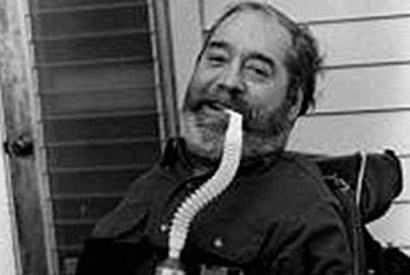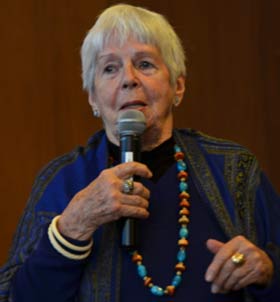In tradition of Ed Roberts, youth with disabilities urged to think big
Local high school students with disabilities were urged to consider higher education, even UC Berkeley, as within their reach, at a campus event celebrating California’s annual Ed Roberts Day, Jan. 23. A take-home message: "your presence is going to matter to the University and the world."

January 23, 2013
“Never let anyone tell you you can’t do something,” undergrad Hamza Jaka, co-president of the campus’s Disabled Students Union, told a crowd of local high-school students Tuesday morning in Alumni House. “That’s what Ed fought for.”

Zona Roberts, 92, mother of Ed Roberts.
The Ed in question, Ed Roberts, “insisted that UC Berkeley let him in” back in the 1960s, added state Sen. Loni Hancock. His activism – first on campus and then beyond – helped launch a worldwide movement, she said.
Held on the eve of California’s annual Ed Roberts Day, Jan. 23, which Hancock helped to establish, the event was designed to urge young people with disabilities to think big about their futures, and to showcase what UC Berkeley has to offer them.
“Your presence is going to matter to the university and world,” said Susan Schweik, an associate professor of English and co-director of the campus’s Disability Studies Program.
Berkeley student Judith Lung, a second-year English major, was in the audience with her service dog, Van Dyke. The Disabled Students Program, she said, is “helping me translate my books into Braille,” adding that Berkeley has “one of the top” such programs in the nation.
“I celebrate Ed Roberts Day every day of the year,” literature and creative-writing teacher Georgina Kleege told the crowd. To those with disabilities, “I belong here, too” was the message of Roberts’ life, she added. “Because of Ed Roberts, we don’t have to think of access as a special favor. It’s your right.”
A contingent of students from the Fashion Art Design Academy, part of Oakland Technical High School, came with questions: Does UC Berkeley offer sound engineering? Digital animation? What about course-load accommodations for those with disabilities? Internship opportunities? Access to the gym?
One Oakland Tech student said he was worried that if he went to college, “rude” students might mock him. Now – after meeting Berkeley students with disabilities, hearing strong words of encouragement and getting a tour of campus – “I see possibilities.”
Roberts’ mother, Zona, 92, recalled how her oldest son contracted polio at age 14 and needed an iron lung to help him breathe. A fast runner who wanted to play baseball, “he went grudgingly into disability,” she said.
“Ed needed a lot of physical care,” she recalled. “I couldn’t have dreamt that he’d ever be at UC Berkeley. But Ed had a very good mind and he began to use it. That was the avenue that was open to him.”
The event ended with a short book reading by Paul Bendix, author of Dance Without Steps, who suffered a spinal-cord injury in 1968, while an undergrad at Berkeley. Afterwards, he spent a month in Cowell Hospital, where Ed Roberts and other activist “Rolling Quads” lived.
“These people in wheelchairs are trying to recruit me into their battery-powered world,” he recalled thinking resentfully. In the decades since, “our understanding of disability has really expanded ” – in no small part thanks to “the culture and knowledge that developed here at Berkeley,” Bendix added.
The open house was co-sponsored by the Disabled Students Program and the Berkeley-based Center for Independent Living, which Roberts co-founded in 1972 and which is now located at the Ed Roberts campus, above the Ashby BART station.
Related information:
- Ed Roberts: His words, his vision (YouTube video)
- Community celebrates Ed Robert Day (2012 NewsCenter article, with background on Ed Roberts Day)
- Ready, willing and able: Students with disabilities prepare for the work world
- Townsend Center piece on Susan Schweik’s book The Ugly Laws
- Georgina Kleege: Telling the story of disability
- ASL courses a sign of the times at Berkeley
- UC Berkeley launches groundbreaking disability research initiative
- ‘Accessible fashion’? To Berkeley senior, it’s about options, visibility